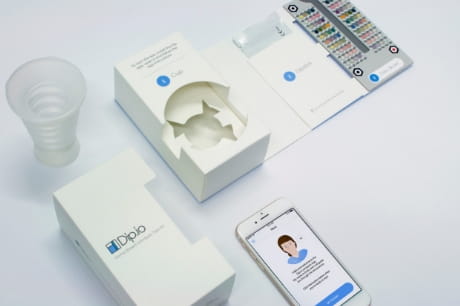New Home Test for Kidney Damage Shows Promising Results
Clinical trial released after nearly 1,000 people participated
NEW YORK -- A clinical trial that followed nearly 1,000 people using a new home test for chronic kidney disease (CKD) shows a high percentage of the participants were happy with the process and preferred it to getting tested in a doctor's office.
The National Kidney Foundation (NKF), Geisinger and Healthy.io evaluated smartphone home testing for CKD. Patients with hypertension – a major risk factor for CKD – that had not been tested in the previous 12 months were given the option of using a smartphone urinalysis test at home and the results were impressive.
Of the participants that received a kit, 71 percent adhered to testing, 98 percent of patients who attempted a home test succeeded, and 89 percent stated they prefer home testing over testing at the physician's office. Among patients who completed home testing mean score for whether they would recommend home urine testing to a friend or colleague was 8.9/10 (i.e. Net Promoter Score of 62).
Despite current guidelines that recommend CKD testing yearly for adults with diabetes and/or hypertension, less than 10 percent of those with hypertension and less than 40 percent of those with diabetes are currently completely assessed.
"Albuminuria is often the earliest sign of kidney disease, and yet, in the majority of people at increased risk due to diabetes or hypertension, it is not tested," said Kerry Willis, PhD, NKF Chief Scientific Officer. "This new test has the potential to help millions of patients find out they have CKD while there is still time to prevent progression to kidney failure."
About 30 million American adults are affected by CKD, but nearly 90 percent don't know they have this life-threatening illness. Early intervention can slow the progression of the disease, which can be deadly if not caught in its early stages.
The trial investigators were Julie Leddy; Christina Yule; Elisabeth Graboski; Jamie Green, MD; Juli Molecavage, DHA, MHA; and Alex R. Chang, MD, MS, all from Geisinger; and Josef Coresh, MD, of Johns Hopkins University.
The investigators concluded that the use of the mailed, smartphone kits may offer an additional modality to improve compliance with albuminuria screening and may be preferable for some patients.
The trial, which began in April:
- Examined the effect of mailed, Healthy.io smartphone urinalysis kits (Dip.io test) to improve detection of albuminuria;
- Randomized 999 non-diabetic patients with hypertension, who were receiving primary care at Geisinger who had never previously completed screening. Patients were randomized into two groups; one group receiving the usual care; and one group who received a mailed Healthy.io urinalysis kit;
- All patients received an educational letter and an electronic lab order for urinalysis to be done at a Geisinger lab;
- Half of the patients (intervention) also were called to ask if they would like to receive a home smartphone urinalysis test; 253 were reached by phone and 69/97 (71.1 percent) of consented patients completed the home test;
- Patients were followed for three months to see if screening was completed; patients with abnormal results from the home test were contacted by the study physicians.
Overall, the intervention increased proteinuria screening completion by (28.9% vs. 18.0%; p<0.001).
There was no difference in the proportion of the detected albuminuria cases between the intervention and control groups.
"The home testing was very well-received and easy to do for patients," Dr. Chang said. "Important limitations of this study were that we required patients to consent by telephone before sending testing kits. Also, few patients who had abnormal urinalysis findings went to the clinic lab for their confirmation testing in the three-month follow-up period. Future research should evaluate optimal screening and confirmation testing strategies-all completed at the comfort of home."
NKF provided the funding for the trial and the Geisinger Institutional Review Board approved the research study.
Kidney Disease Facts
In the United States 30 million adults are estimated to have chronic kidney disease—and most aren't aware of it. 1 in 3 American adults are at risk for chronic kidney disease. Risk factors for kidney disease include diabetes, high blood pressure, heart disease, obesity and family history. People of African American, Hispanic, Native American, Asian or Pacific Islander descent are at increased risk for developing the disease. African Americans are 3 times more likely than Whites, and Hispanics are nearly 1.5 times more likely than non-Hispanics to develop end stage renal disease (kidney failure).
About Healthy.io
Healthy.io is transforming prevention for kidney disease for the millions of patients who fall through the cracks of the existing, centralized system. Having created a new category of smartphone urinalysis that can replace the centralized lab device, the company offers a full service that addresses the staggering cost and burden of CKD. With an 'adherence as a service' offering, patients get a test kit sent home and results are automatically transmitted to their medical record for physician review. Patients can test themselves at their own convenience, detect the disease early and get the care they need. In Israel and Europe, Healthy.io's digital urinalysis pathways are already a reality for over 100,000 patients.
About Geisinger
Geisinger is among the nation’s leading providers of value-based care, serving 1.2 million people in urban and rural communities across Pennsylvania. Founded in 1915 by philanthropist Abigail Geisinger, the non-profit system generates $10 billion in annual revenues across 134 care sites - including 10 hospital campuses, and Geisinger Health Plan, with 600,000 members in commercial and government plans. The Geisinger College of Health Sciences educates more than 5,000 medical professionals annually and conducts more than 1,400 clinical research studies. With 26,000 employees, including 1,600 employed physicians, Geisinger is among Pennsylvania’s largest employers with an estimated economic impact of $14 billion to the state’s economy. On March 31, 2024, Geisinger became the first member of Risant Health, a new nonprofit charitable organization created to expand and accelerate value-based care across the country. Learn more at geisinger.org or connect with us on Facebook, Instagram, LinkedIn and X.


